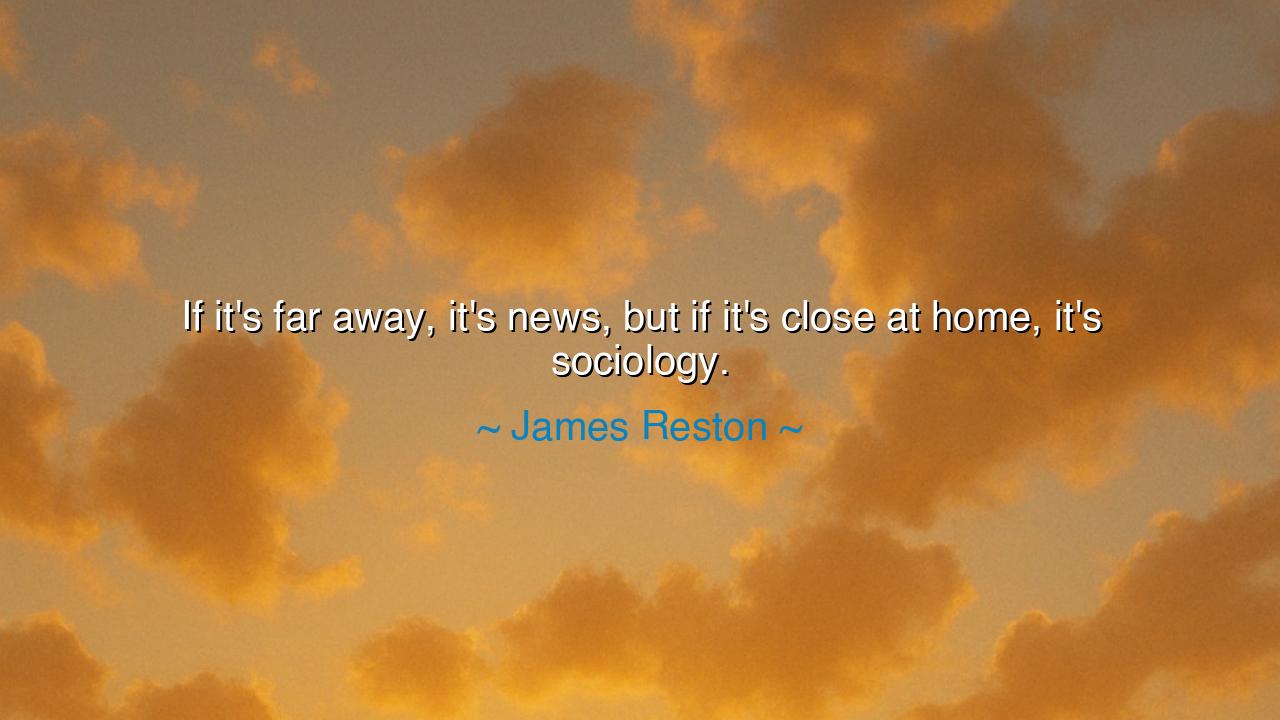
If it's far away, it's news, but if it's close at home, it's






There are words that unmask the strange paradox of human perception — words that expose how distance changes not only what we see, but how deeply we feel. Such are the words of James Reston, the journalist and thinker who wrote: “If it’s far away, it’s news, but if it’s close at home, it’s sociology.” Beneath this simple observation lies a vast meditation on empathy, curiosity, and the way human beings divide the world into “us” and “them.” His words call us to look closer — to see that what we so easily dissect and analyze in others may, in truth, be our own reflection.
When Reston speaks of what is far away as news, he speaks of the mind’s tendency to turn distant suffering into spectacle. A famine in another land, a war in another continent, a revolution across the sea — these we read about, discuss, and debate. We observe them as stories, as events belonging to another world. But when hardship strikes our own town, our own families, our own hearts, suddenly the tone changes. It ceases to be an “incident” and becomes a study of society, a problem to be understood, explained, and rationalized. What was once viewed with curiosity becomes personal; what once entertained now demands introspection. Thus, the line between “news” and “sociology” is not a line of truth, but of proximity — of how near the pain stands to our own doorstep.
This is not a condemnation of curiosity, but a revelation of its limits. For distance makes the world appear simple; closeness reveals its depth. The ancients understood this well. When the philosopher Thucydides chronicled the Peloponnesian War, he described not only the armies and politics, but the disintegration of moral order within his own city of Athens. To outsiders, the war was news — a clash of power and ambition. But to those within it, it was sociology — a mirror reflecting the collapse of trust, the fever of fear, and the fragile nature of human virtue. Reston’s words remind us that we are quick to judge what happens afar, yet slow to understand what happens within.
Consider, too, the great calamities of our own age — the wars, the migrations, the floods, the plagues. When tragedy unfolds in a far land, we turn our eyes toward it briefly, as toward a distant storm. We measure it in numbers and headlines. But when that same storm reaches our own shores — when it drowns our cities or enters our homes — then we begin to ask the deeper questions: What have we done? What kind of society have we built? That is when sociology begins — when we no longer see events as foreign occurrences, but as symptoms of our shared humanity.
Reston’s wisdom thus strikes at the heart of compassion. It is easy to study others, to theorize about distant struggles, to frame them as curiosities of culture or failures of policy. It is harder, far harder, to look inward — to study ourselves with the same cold clarity we reserve for others. The historian may analyze a foreign nation’s decline with precision, but tremble to examine the cracks in his own. The true sage, however, knows that wisdom begins at home — that the world’s suffering is one tapestry, woven from the same human threads that bind every household, every nation, every soul.
In this light, Reston’s quote is both an indictment and an invitation. It asks us to close the distance between news and empathy, between observation and responsibility. It reminds us that the suffering of others is not a performance for our consumption, but a warning, a lesson, and a call to action. To see tragedy “close at home” is to see it rightly — not as theory, but as life. The wise do not wait for pain to arrive at their door before they care; they recognize that every distant cry is an echo of their own humanity.
And so, let this be the teaching: Do not wait for the far to become near before you understand. The true scholar of life studies both the distant and the intimate with equal compassion. When you read of sorrow in another land, do not ask, “What went wrong there?” but “What does this reveal about us?” When you witness injustice abroad, do not dismiss it as “news,” but see it as the reflection of forces that live, perhaps quietly, within your own society. In doing so, you will transcend the blindness of distance and join the ranks of those who see the world as one.
For the heart that feels only what is close will live a small life, but the heart that feels both near and far — that refuses to divide humanity by geography — becomes vast as the sky itself. Let us, then, honor the wisdom of James Reston by expanding our circle of care. Let every faraway story be treated as our own, every distant suffering as a mirror. For only when we do so shall we bridge the divide between news and understanding, and become, at last, not observers of the world — but its conscious, compassionate participants.






AAdministratorAdministrator
Welcome, honored guests. Please leave a comment, we will respond soon